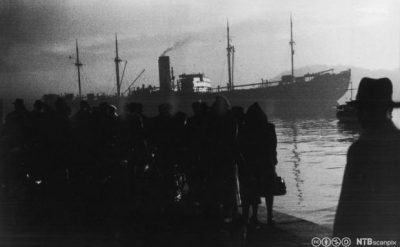Somber ceremonies attracted hundreds of people including the prime minister and crown princess on Sunday, which marked 75 years since most of Norway’s remaining Jewish population was deported to Nazi German death camps during World War II. The goal was to make sure Norwegians never forget what Prime Minister Erna Solberg called a “painful and uncomfortable” part of Norway’s history.

It was in the dark, early-morning hours of November 26, 1942 that around 300 men from the German SS, Norway’s own state police and the Norwegian Nazi organization known as Hirden gathered in downtown Oslo. Historian Johanne Bergkvist wrote in newspaper Dagsavisen on Monday how around 100 taxis had been ordered, and they all fanned out to arrest Jewish Norwegians in Oslo and neighbouring Aker who hadn’t already been rounded up.
They were taken to the pier just below the Akershus Fortress and Castle at Oslo’s inner harbour. From there, 529 Jewish Norwegians were ordered on board the vessel D/S Donau, which sailed to to Szczecin in Poland. The men, women and children ranging in age from four months to 81 were then ordered on board trains and taken to the infamous Auschwitz-Birkenau concentration camp. Most were stripped of their belongings and killed within the week.
There were a total of five organized deportations by ship that sent a total of 773 Jewish Norwegians to Nazi Germany during the war years. Only 38 members of Norway’s Jewish community who hadn’t fled Norway in advance, mostly to Sweden, survived.

While the Nazi German-ordered deportations have long been recognized and denounced, it’s only recently that Norwegian complicity in the arrests has been stressed. It has been argued that the Norwegian police officials, politicians and ordinary citizens involved in the deportations were caught in a wartime situation and had little choice but to carry out the orders of the Nazi German occupying forces. There was, however, strong anti-Semitism at the time, and documents have emerged showing how Norwegian officials actively participated in the deportations. Many were also aware that the deportees would never return.
There were only around 2,200 Jews living in Norway in 1942, wrote Bergkvist, most of them in Oslo. The heart of the capital’s Jewish community lay in the neighbouring downtown districts of Grünerløkka and Hausmannskvartalene. The Norwegian police sent trucks to this area, starting at around 4:30am. Those arrested in Oslo that morning were joined at the pier by Jewish men and boys who’d been arrested a month earlier and imprisoned at the Berg prison camp near Tønsberg.
Remembering the victims
Today the area in Oslo features brass plaques bearing the names of many of those rounded up and later murdered. The plaques are set into the sidewalks outside the addresses where their homes and belongings were also confiscated by state officials. On Sunday the names of those killed were read aloud during a ceremony on the waterfront where the Donau was tied up.
Another ceremony to honour the memories of those deported and killed was held in the University of Oslo’s Aula Sunday evening, attended by Solberg, Crown Princess Mette-Marit (recovering from recent illness) and Oslo Mayor Marianne Borgen among many others. It was organized by the Holocaust Center, which was financed by state reparation funds, along with Det Mosaiske Trossamfund in Oslo and Det Jødiske Samfunn inTtrondheim. “No one must forget what happened, and this is a fine way to remind everyone about those taken away,” Leif Grusd, who was a child when his family fled to Sweden before the waves of arrests began.
Grusd thinks it’s also important to “bring forth all the escape stories” that often involved Norwegians who helped their Jewish friends, neighbours or associates flee to Sweden. They often risked their own lives in the process, such as Rolf Syversen who owned a gardening business at Økern where many Jewish Norwegian refugees were hidden until they could be safely transported to and over the border to Sweden. Syvertsen was later arrested and shot himself.
Solberg apologizes again
All survivors of the deportations have since died but Solberg also stressed how they must not be forgotten. “Nearly a third of the Jewish population in Norway was brutally killed during the war years, because they were Jews,” Solberg said in a speech at the Sunday evening ceremony. “We remember them all and it’s painful and uncomfortable. The Nazis were behind the Jewish extermination … but we can with certainty contend that the initiative to the actions against the Jews in Norway was taken in Norway, not as a directive from Berlin. Norwegians were responsible, and Norwegians were victims.”
Solberg noted how her precedessor Jens Stoltenberg issued an official apology on the 70th anniversary of the beginning of what’s considered Norway’s own Holocaust. Norway’s state police department apologized as well. “That was important, it was correct and I want to repeat the apology here,” Solberg said. “And we must learn from the mistakes that were made.”
newsinenglish.no/Nina Berglund

